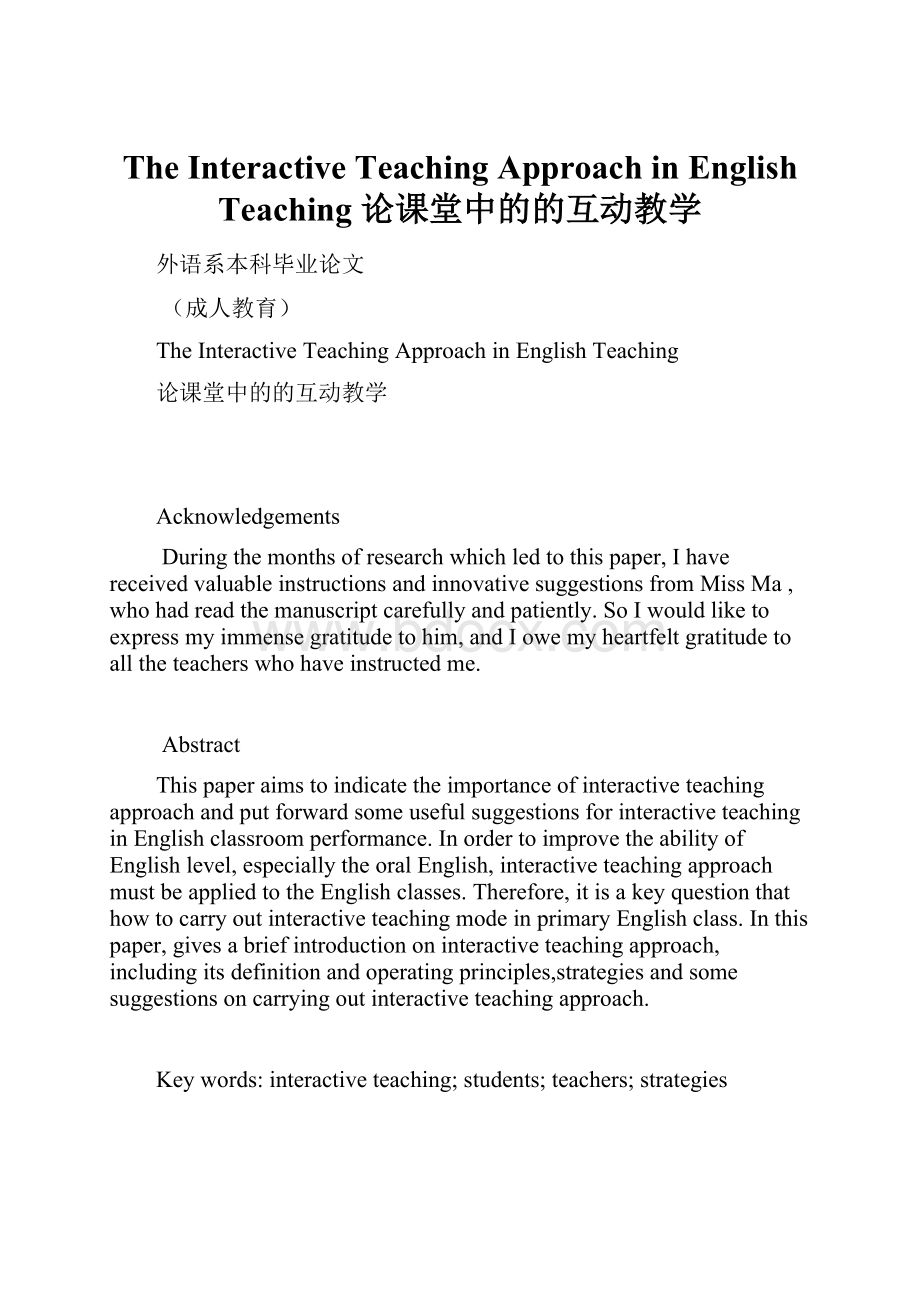The Interactive Teaching Approach in English Teaching论课堂中的的互动教学.docx
《The Interactive Teaching Approach in English Teaching论课堂中的的互动教学.docx》由会员分享,可在线阅读,更多相关《The Interactive Teaching Approach in English Teaching论课堂中的的互动教学.docx(17页珍藏版)》请在冰豆网上搜索。

TheInteractiveTeachingApproachinEnglishTeaching论课堂中的的互动教学
外语系本科毕业论文
(成人教育)
TheInteractiveTeachingApproachinEnglishTeaching
论课堂中的的互动教学
Acknowledgements
Duringthemonthsofresearchwhichledtothispaper,IhavereceivedvaluableinstructionsandinnovativesuggestionsfromMissMa,whohadreadthemanuscriptcarefullyandpatiently.SoIwouldliketoexpressmyimmensegratitudetohim,andIowemyheartfeltgratitudetoalltheteacherswhohaveinstructedme.
Abstract
ThispaperaimstoindicatetheimportanceofinteractiveteachingapproachandputforwardsomeusefulsuggestionsforinteractiveteachinginEnglishclassroomperformance.InordertoimprovetheabilityofEnglishlevel,especiallytheoralEnglish,interactiveteachingapproachmustbeappliedtotheEnglishclasses.Therefore,itisakeyquestionthathowtocarryoutinteractiveteachingmodeinprimaryEnglishclass.Inthispaper,givesabriefintroductiononinteractiveteachingapproach,includingitsdefinitionandoperatingprinciples,strategiesandsomesuggestionsoncarryingoutinteractiveteachingapproach.
Keywords:
interactiveteaching;students;teachers;strategies
摘要
这篇论文目的在于说明互动教学在课堂的重要性,以及提出了一些有用的建议。
为了提高英语水平,特别是口语的能力,互动教学必须被运用到英语课堂中。
因此,在如何运用互动教学模式是非常关键的。
在这篇论文中,对互动教学这种教学方法做了大概介绍,其中包括这种教学方法的定义,还有一些策略和建设性建议,以及在实施互动教学中的一些影响。
关键词:
互动教学;学生;老师;策略
Contents
Acknowledgements…….…….…….…….…….…….…….…….…..i
Abstract…….…….…….…….…….…….…….…….……………….ii
摘要…….…….…….…….…….…….…….…….…………………..iii
1.Introduction………………………………………………………..1
1.1Theconceptofinteractiveteachingapproach…………………………..1
1.2Operatingprinciplesofinteractiveteachingapproach……………………
1.2.1Learner-centeredprinciple………………………………………1
1.2.2Activity-basedprinciple…………………………………………3
1.2,3Principleofrelevance…………………………………………...4
2.Strategiesforinteractiveteachingapproach……...………………6
2.1Raisingquestions…………………………………………………….6
2.2Encouragingrole-play………………………………………………..7
2.3Creatinginterestinglanguagegames……………………………………7
2.4Engaingincooperativelearning………………………………………...8
3.Suggestionsonimplementinginteractiveteachingapproach.…….9
3.1Reflectiveteaching……………………....……………………….......10
3.2Cultivatingpositivetecher-studentrelationship……………….......……..11
3.3Supportinglearningenviroment...………………………......................12
4.Conclusion………………………....………………………..............14
Bibliography………………………....………………………................15
1.Introduction
Withthedevelopmentofsociety,interactiveteachingapproachisbecomingmoreandmoreimportantinEnglishteaching.Interactiveteachingisatheoreticandstrategicsystemappliedbymanycountriesintheworldinthepastthreedecades.However,EnglishclassesinChinalacktheatmosphereofinteractionbetweenteachersandstudents,andtraditionalteachingmethods,whichregardteachersasthecoreofteachingactions,stillplaytheimportantroleinChineseclasses.Therefore,accordingtothesituationofEnglishteachingtoday,theauthorattemptstoindicatetheimportanceofinteractiveteachingapproach,andadvocatesthatinteractiveteachingcanbecarriedoutefficientlyandwidelyinEnglishclassroomsoastohelpteacherstoimprovetheirteachingskillsandhelpstudentstocultivatetheirstudyability.
Atthebeginningofthisthesis,thedefinitionofinteractiveteachingandoperatingprinciplesofinteractiveteachingapproachareintroduced.Thesecondpartdiscussesthestrategiesforinteractiveteachingapproach.Andthethirdpartattemptstobringforwardsomesuggestionsonimplementinginteractiveteachingapproach.Withalltheworkdone,thethesiscomestotheconclusionthatthoseapproachesandsuggestionstheauthorgivenareusefulandeffectivetocultivateinteractionbetweenteachersandstudents.
1.1Theconceptofinteractiveteachingapproach
Interactiveteachingapproachindicatesthatteachersgobeyondlanguagestructuresanddeveloplearners’communicativecompetencethroughinteraction.AsWilgaM.Riverspointsout,interactionrefersto"studentsachievefacilityinusingalanguagewhentheirattentionisfocusedonconveyingandreceivingauthenticmessages"(Rivers,2000:
4).Theinteractiveteachingapproach,whichemphasizesthevaluesofinteraction,ismoreaclusterofapproachesthanasinglemethodology.Interactionbetweenteachersandstudentsisanimportantfeatureofcooperativelearning,whichcanhelpteachersguidestudentstoimprovetheirlearning.Meanwhile,studentsarebecomingmoreandmoreinterestedintheirEnglishlearningbysomeactivitiesandgames.Therefore,interactiveteachingapproachplaysasignificantroleinprimaryEnglishclass.
1.2Operatingprinciplesofinteractiveteachingapproach
Interactiveteachingemphasizesontheinteractionbetweenteachersandstudents,butitisdifficulttodealwiththerelationshipbetweenteachersandstudentsinclass.Inordertoavoidthesituationthatteachersdominatethewholeclasswithoutinteractionwithstudents,someusefulprinciplesofinteractiveteachingwillbeoperatedinprimaryEnglishclass,includinglearner-centeredprinciple,activity-basedprincipleandprincipleofrelevance.
1.2.1Learner-centeredprinciple
Learner-centeredprincipleisdefinedasthefollowing:
ontheonehand,teachersshouldputstudentsatthecenterofclassroomorganizationandrespecttheirneeds,strategies,andstyle.Thatistosay,inprimaryEnglishteaching-learningprocess,teachersshouldrespectindividualpreferenceandassiststudentsindiscoveringtheirownpreferenceinlearningstyle,insteadofinterfereandcontrolstudents.Ifstudentsaremoreinvolvedintheteachingandlearningprocess,whichmeansthattheyarelearningwhattheywouldliketoknowandlearningintheirpreferableway,theywillcertainlyhavemoreinterestinthelearningandfeelmoreresponsiblefortheirlearning.Moreover,thelearner-centeredclassroomshouldguidethestudentstomakecontributionstolessonplanning,presentation,andassessment.Studentsshouldshareinformationwiththeirclassmates,anddifferentgroupsexplaingrammartoshareknowledge,andevenstudentscantakeonteacher-likerolestoorganize.Soteachersshouldgivemorechancetolettheirstudentsplayamainroleinclass.
Ontheotherhand,theteacherplaysadiversifiedmulti-dimensionalroleinaninteractiveteachingclassroom.AccordingtoMarionWilliams&RobertL.Burden,thereisasignificantrolefortheteacherasmediatorinthelanguageclassroom.Theteachercanplayanimportantpartinpromotingeffectivelearninginothersignificantways(Williams&Burden,2000:
131).IntraditionalEnglishclassrooms,theteacherdominatestheclassroombecauseheistheauthorityoftheknowledgeandthecenteroftheclassroomactivities.Themostimportantthingsforteacherstodoaretodisciplinetheclass,passontheknowledge,andexplicitthepuzzles.
Insum,teachersshouldrelinquishcontrolovertheclassbutnotlosecontrol,andaslearner,studentsshouldregardthemselvesasthecenterofclassroomtocreatetheirownlearningspace.
1.2.2Activity-basedprinciple
Activity-basedprincipleininteractiveteachingisthatlearningaforeignlanguageisundoubtedlynotonlytocreategrammaticallycorrectsentencesbutalsotocommunicateeffectivelyandappropriately,andactivitiesshouldbeimplementedinordertotransferknowledgeandskills.Thosetraditionalteachingmethodsthatemphasizeonthemasteryofknowledgebutneglectcultivatingstudents’communicativecompetenceresultinthatgenerallystudentsfailtocommunicateinthetargetlanguage.
It’scommoninChinathatauniversitygraduatewhohaslearnedEnglishfortenyearsfeelsitdifficulttohaveaconversationwithanative-speakeraboutsomecommontopics.Itseemsthathecan’ttransferwhathehaslearnedtotherealcommunication.Whatthestudentsdoinatraditionalclassroomistolearnaboutthelanguage,andevenwhentheyopentheirmouths,theyarenormallyorganizedtodosomerepetitiondrills.Especially,somemechanicexercisestostrengthentheknowledgeormakeashortresponsetosomequestionsraisedbytheirteachers.Thatis,teachersshouldcreateopportunitiesforstudentstotakepartinmeaningfulinteraction,especiallycommunicativeactivities.Communicativeactivitiesprovidestudentswithopportunitiestoworkforthesamegoal,thereforeithelpstodeveloppositiverelationshipamongstudentsandresultincreatinganenvironmenttosupportlanguagelearning(Littewood,2000:
34).
Inshort,peoplelaymoreandmoreemphasisonactivitiesinEnglishclass.
1.2.3Principleofrelevance
Inordertocarryoutlearner–centeredandactivity-basedprinciple,theprincipleofrelevanceoughttobestressed.TheEnglishclassroomperformanceshouldberelevanttolearners’capability,interestandperceivedneeds.Ausubelcontendsthathumanlearningtakesplaceinthehumanorganismthroughameaningfulprocessofrelatingneweventsoritemsalreadyexistingcognitiveconceptsorpropositions.Learningisthereforeaprocessofrelatingandanchoringnewmaterialtorelevantestablishedentitiesinthelearner’scognitivestructure(citedinWang,2000:
210).
Effectiveactivitiesarerelatedtostudents’capabilityandneed.Nunanclaimsthat"Itisthesesubjectiveneedsderivablefrominformationonlearners’wants,expectationsandaffectiveneedswhichareofmostvalueinselectingcontentandmethodology."If"whattolearn"and"howtolearn"actuallysuitthestudents’needs,theywillbecomparativelyandeasilymotivated.Learningisnotonlyapains-takingpreparationfortheremotefuturebutalsoanenjoyableexperiencetoday.Especiallyforyoungchildren,they